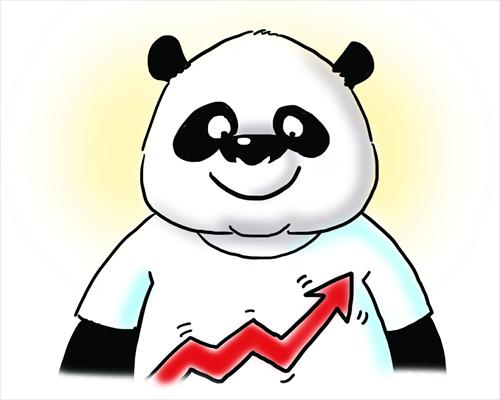Statistics shows economy still flourishing despite West’s naysayers

Illustration: Shen Lan /GT
There is a Chinese adage that "Don't be afraid of the cloud which blocks your lines of sight when you want to look into the distance. The distant scenery is worth appreciation no matter what difficulties we will meet." Facing the prospects of the Chinese economy, it is difficult for Western observers to maintain such an attitude. When Chinese booming economy grew at an annual rate of more than 10 percent, they considered such a situation was both perplexing and worrying, and concluded a view known as the "Chinese Economic Threat." In contrast, when the growth rates slows down to 6.9 percent, they hold their bearish position and predict an economic crisis.
However, throughout the past 30 years, Western observers who were pessimistic about China's development have proved wrong, and soon the voices of betting against China will peter out into a historical footnote.
Why do some observers get used to sounding a downbeat tone about the growth of China? Are they not familiar with China or do they have an ulterior motive? Maybe both factors generate the phenomenon. As a result, we should distinguish and analyze Western opinions carefully.
On the one hand, we need to push back forcefully against those who misread China maliciously. On the other hand, it's acceptable if some observers express well-meaning concerns about the Chinese economy.
During these years, with the rapid development of China, its economic fluctuation has been considered to have a direct and significant influence on Westerners' vital interests. Some people's concerns are well grounded. We need to strengthen communication with them and clarify confusion.
In 2011, US economist Nouriel Roubini came up with a devastating prognosis on China's economy and its economic growth pattern. He believed that China would probably have a hard landing in 2013. But in fact, China's economy has not suffered the crisis as he predicted.
Recently, business magnate George Soros expressed his bearish attitude in the Davos Forum, claiming that "A hard landing is practically unavoidable" in China.
However, such kind of voice is not the mainstream in the Davos Forum. Klaus Schwab, founder of the Davos Forum, has opposite opinions. "For China to grow seven percent is the equivalent of adding an economy the size of Switzerland or Indonesia every year," Schwab said. Jim O'Neill, creator of the "BRIC" concept, insisted recently that China's 2015 GDP increment at the 6.9 percent growth rate was very considerable, while China's economic structure is experiencing a delightful change.
In fact, among global major powers, there are only two countries, China and India, with a growth rate of more than 6 percent in 2015. However, the scale of the Indian economy is about one fifth of that of China. It is conservatively estimated that the Chinese contribution to the global economic growth makes up more than 25 percent.
Although the international oil price is falling, China should not be held responsible because its crude imports do not show a sharp decline. In terms of commodities, China's import of soybeans increased by more than 44 percent in 2015.
Naysayers only focus on the challenges of China's economy instead of its achievements. As a matter of fact, the continuous improvement of systems and policies indicates the tenacity of China's economy.
At the same time, the transformation of the economic structure is being propelled steadily and will lay a solid foundation for the steady growth of the global economy.
In addition, the gradual enhancement of international production capacity cooperation offers a huge investment opportunity for countries all over the world.
And our industrial structure is being further optimized. As data shows, in 2015, the tertiary industry's growth value accounted for 50.5 percent of GDP, which surpasses the objectives of the 12th Five-Year Plan.
Beyond that, mainland investors realize an accumulative total investment of 735.08 billion yuan ($112.9 billion) in 2015, with year-on-year growth of more than 14.7 percent. Obviously, China is still a booster of the global economy instead of a source of crisis. The generally steady economy, which combines progress, innovation and excellence with stabilization, and helps the global economy get out from its plight.
Chen Fei is vice dean of the Political Science Department and Yuan Yuan is a student from Zhongnan University of Economics and Law. opinion@globaltimes.com.cn Follow us on Twitter @GTopinion